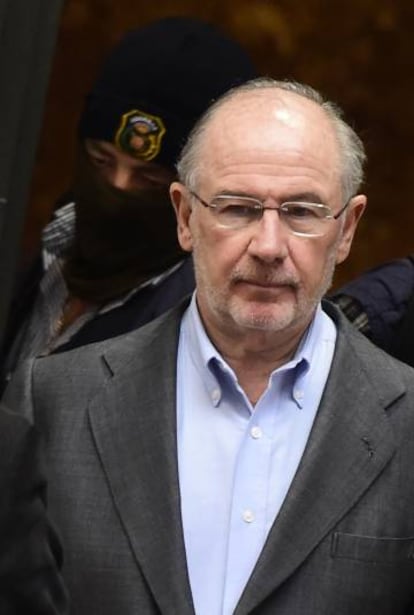Ex-IMF chief in the spotlight as Bankia credit card trial gets underway
Rodrigo Rato and 64 other defendants are accused of misusing millions of euros from the failed lender

One of the biggest scandals to rock Spanish society during the economic crisis has finally reached the courts.
Monday marked the opening of the trial over the so-called “tarjetas black,” complimentary credit cards handed out to dozens of officials at two struggling banks.
The credit cards were not opaque and they were not ‘black’
Defense lawyer for Jesús Pedroche
Between 1999 and 2012, former executives and board members at Caja Madrid, which later merged with other failed lenders to form Bankia, were given credit cards that drew money from a bank fund. These amounts did not show up on any bank documents or job contracts, nor were they reported in tax returns.
The 65 defendants (there were originally 66, but one of them has since passed away) used these cards liberally to pay for personal expenses, racking up bills worth €15.5 million on everything from gourmet restaurants to designer clothes and expensive trips.

The suspects include Rodrigo Rato, a former finance minister with the Popular Party (PP) who also headed the International Monetary Fund (IMF) between 2004 and 2007.
Rato became chairman of the Caja Madrid savings bank in 2010, then went on to head Bankia, the bank that resulted from the merger of Caja Madrid with six other struggling lenders.
The executives and board members who enjoyed this financial bonus represent nearly every political party and every labor union in Spain. They face prison terms of one to six years for embezzlement.
A concerted effort
A group of protesters hurled insults at the defendants as they walked into the headquarters of the High Court in San Fernando de Henares (Madrid) on Monday.
Once inside, defense lawyers launched a concerted effort to get their clients exonerated from further prosecution, alleging that the Excel spreadsheet detailing their clients’ bills between 1999 and 2003 is not a valid piece of evidence.
“We neither know about the Excel [spreadsheet] nor what kind of custody it’s been in. Besides, it’s full of mistakes, duplicate expenses and places where my client has never been, and there is nothing to support that those expenditures really took place,” said Dolores Márquez de Prado, the lawyer for Ángel Gómez del Pulgar, a board member sponsored by the Socialist Party (PSOE).
Defense lawyers launched a concerted effort to get their clients exonerated from further prosecution
Lawyers also sought to get Bankia, which is part of the private prosecution, thrown out of the case on the grounds that it was not affected by the alleged wrongdoing. A third line of reasoning attempted to convince the bench that any existing crimes have already expired under the statute of limitations.
But experts are certain that once these preliminary issues are dealt with, the hearings proper will get underway on Friday as planned with a statement by Rodrigo Rato. According to the schedule of hearings, the last defendant will testify on October 7, followed by expert witness accounts until December 23.
The trial will try to determine whether the cards were really part of the bank executives’ salaries and legal payment for board members, as the defendants now claim.
State attorneys and the private prosecution are focusing particularly on Rato and Miguel Blesa, his predecessor at Caja Madrid. Both men are accused of misusing funds and face prison terms of up to six years.
Some of the board members claim that their credit cards were a supplement because of their dedication to the bank, and that the Tax Agency was aware of their existence.
“They were not opaque and they were not black,” said the defense lawyer for Jesús Pedroche, a board member for the Popular Party (PP), who faces a four-year prison term if found guilty.
Living in the lap of luxury
Spaniards struggling under the weight of a long economic crisis were particularly infuriated to hear that executives had spent €3 million on restaurants, €2 million on cash withdrawals, over €1.5 million on trips, over €1 million on groceries and household items, nearly €800,000 on hotels and around €700,000 on jewels, clothes and accessories.
And this, at a lender that ultimately had to be bailed out using €22.4 billion of taxpayers' money.
The credit cards were used up until May 2012, when the state stepped in because of the imminent risk of bankruptcy. This, in turn, triggered a EU bailout of Spain's entire financial system.
The scandal broke in October 2014, and since then, only 14% of the money has been returned.
However, any alleged crimes perpetrated between 1999 and 2003 have expired under the statute of limitations, meaning that only the money spent between then and 2012, amounting to €12 million, is under scrutiny.
English version by Susana Urra.
Tu suscripción se está usando en otro dispositivo
¿Quieres añadir otro usuario a tu suscripción?
Si continúas leyendo en este dispositivo, no se podrá leer en el otro.
FlechaTu suscripción se está usando en otro dispositivo y solo puedes acceder a EL PAÍS desde un dispositivo a la vez.
Si quieres compartir tu cuenta, cambia tu suscripción a la modalidad Premium, así podrás añadir otro usuario. Cada uno accederá con su propia cuenta de email, lo que os permitirá personalizar vuestra experiencia en EL PAÍS.
¿Tienes una suscripción de empresa? Accede aquí para contratar más cuentas.
En el caso de no saber quién está usando tu cuenta, te recomendamos cambiar tu contraseña aquí.
Si decides continuar compartiendo tu cuenta, este mensaje se mostrará en tu dispositivo y en el de la otra persona que está usando tu cuenta de forma indefinida, afectando a tu experiencia de lectura. Puedes consultar aquí los términos y condiciones de la suscripción digital.








































